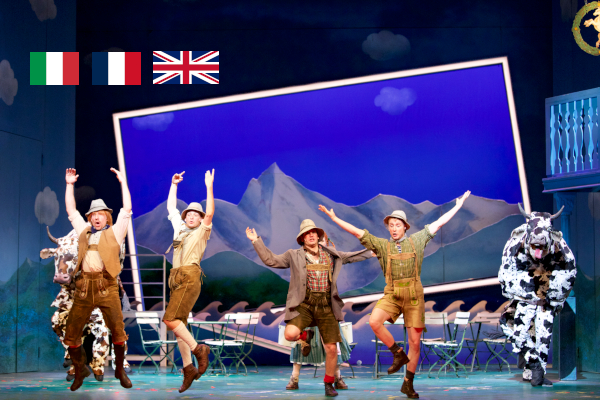Everybody to the White Horse
Im Weissen Rössl, opérette by Ralph Benatzky, sing-along version, at the Gärtnerplatztheater, Munich, 23 November 2024
In German-speaking countries, some of the Singspiel Im Weissen Rössl’smelodies are popular songs, mostly thanks to a 1960 movie where Austrian singer and actor Peter Alexander played the main part. The film has left the impression of something rather corny and kitschy, since it totally neglected the caustic Berlin humour of the piece that mocks on one hand the growing zeal of the high society for Alpine tourism, on the other hand the Austrian nostalgia of its recently lost empire, and - already! - the greed of the budding tourism industry. Since the 2006 discovery of the original scores, however, that are much closer to the Berlin musical scene of the Roaring Twenties, the ‟Rössl” has returned to the theatre programs, in an updated version that unites jazz elements, Austrian and Bavarian folk music, and the schlager song of the time, with intermittent dance numbers. With the spoken texts slightly modernised and an imaginative stage direction, it can be most amusing, as we found out at the Gärtnerplatztheater.
The plot is extremely simple: in an inn at the Salzkammergut, emblematic touristic region in Austria, after the usual misunderstandings, three couples will come together. There are Josepha Vogelhuber, the landlady of the inn, and Leopold Brandmeyer, her head waiter who is in love with her. She, however, has a crush on attorney Dr Siedler, a regular client. Siedler, in his turn, will fall in love at first sight with Ottilie, the daughter of underwear producer Wilhelm Gieseke. Gieseke would marry Ottilie to Sigismund Sülzheimer, the son of a business partner. Sigismund falls in love with Klärchen, the daughter of passionate tourist Pr. Dr. Heinzelmann…
Besides these protagonists, we will also meet the Austrian emperor Franz Josef I and his valet Ketterl, as well as the staff of the inn, and a multitude of secondary characters and extras. In the colorful and variegated staging by Josef E. Köpplinger, all these people will come together with song and dance. The set is simple and effective: to the right, we see the inn and one balcony, the background is taken up by a painting of a mountain in a lighted frame, hanging slightly askew, as well as by a few rows of cut-out waves. This background will be populated by: a group of sportsmen in striped shirts, a group of peasants in lederhosen, a group of rowers, a huntsman in traditional garb complete with a shaggy beard and gun over his shoulder, dragging his dachshund on wheels, who is after the pretty post-girl, who knows why… Flowers and a shining butterfly will appear later on, and also a group of Amourettes in blue costumes with embroidered Edelweiss, a caricature of tradition wear, and whose light wight wigs remind us of Christmas angels - and they dance a hot Charleston number. This kind of contrast as well as the wonderful costumes - all the traditional clothes are authentic and high quality - and the lovely set by Rainer Sinell are simply charming. The marvelous singers and the dancers and extras are bringing together lightness and artistic excellence. Andreas Partilla and the orchestra of the Staatstheater am Gärtnerplatz seem to be having fun with this variegated score - and we sometimes suspect them to enjoy a moment of schadenfreude when a tempo change takes the singing public somewhat by surprise.
Sigrid Hauser et Daniel Prohaska, with their perfect Austrian pronunciation, are a perfect couple Josepha - Leopold, their spoken texts are as charming as their singing is marvelous. Anna Overbeck is admirable in the role of Klärchen, and her ‟father”, Erwin Windegger, impressed us with a yodel solo. Ludwig Mittelhammer is charming and serious in the part of Dr Otto Siedler and his Ottilie, Andreja Zidaric is blond and quick and adorable as well.
This production has premiered in 2012, and since then the Gärtnerplatztheater presents every year one representation where the public is invited to participate: every spectator is fitted out with a kit containing an Austrian flag, to wave when the emperor is on stage, a red heart that is to be brandished during the love scenes, a bag of mini-pretzels to snack during a breakfast scene, a little bell to salute the entrance of a cow, a handkerchief to wave whenever Sigismund appears, and finally a shower cap against the violent rain that ends Act I.
The sound of paper rustling as people search for the correct item in their bags sometimes makes the spoken text inintelligible - but the view of an entire theatre hall in shower bonnets has a certain unexpected charm. Some wear traditional costumes, one gentleman is so proud of his hat that he keeps it on during the performance, and even gets up at the entrance of the emperor; some people seem to think that sing-along equals chat-along and that their neighbors will appreciate their singing along also to bits that obviously belong to the professionals on stage… If this concept thus breaks - at least for one evening - the codes of acceptable behaviour at the theatre, it makes it somewhat more difficult to fully appreciate the work of the artists on stage. But then the observation of the public adds another dimension of fun.
A diverting and interesting evening all in all - bravi tutti!


